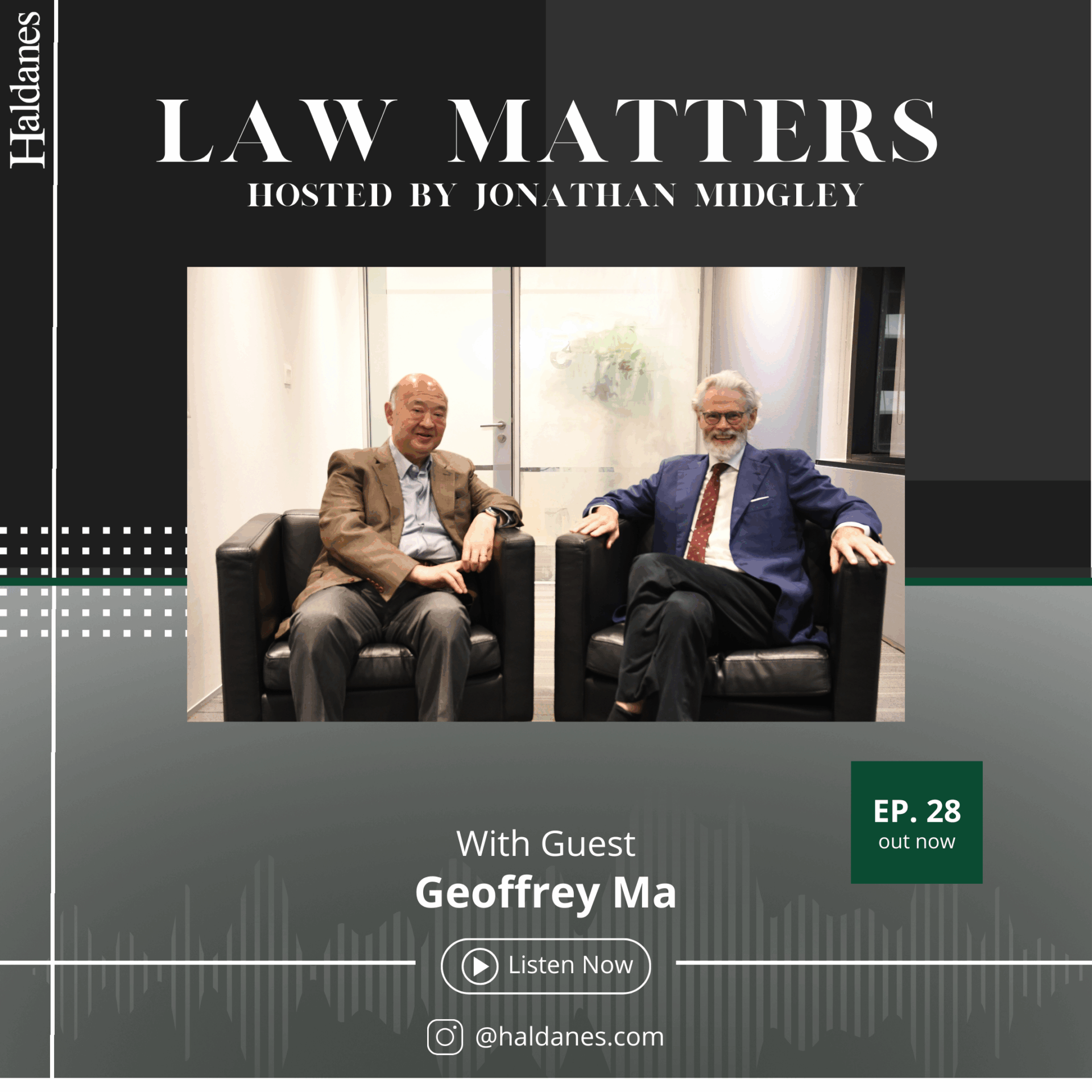Haldanes successfully represented a Defendant in an application for stay of court proceedings in favour of arbitration

In a previous article we discussed recent developments around resolving disputes through arbitration in Hong Kong.
In this article, we are pleased to share a further update, this time relating to a successful application by a Defendant represented by Haldanes to the Hong Kong Court to stay a set of proceedings commenced in the High Court (HCA 1032/2023) in favour of arbitration.
As in many other cases with similar characteristics, the case of Jingdong E-Commerce (Trade) Hong Kong Corporation Limited v Mavin Electrons Limited [2024] HKCFI 3110 [link to judgment] involves multiple contracts between the parties containing different dispute resolution clauses.
In the Decision, Deputy High Court Judge Jonathan Wong discussed the relevant principles governing a stay in favour of arbitration, and came to the conclusion that the well-established conditions for granting a stay of proceedings in favour of arbitration were satisfied.
His Lordship accordingly allowed the application brought by Haldanes on behalf of the Defendant, and ordered the Plaintiff to pay costs of the application on an indemnity basis.
The following is a quick summary of the facts and rulings of the case, together with some key take-aways arising from it.
Material Background Facts
The Plaintiff and the Defendant first entered into a Master Sale and Purchase Agreement (“SPA”) on 10 November 2021 setting out provisions for the supply of certain electronic products by the Plaintiff to the Defendant. Significantly, the SPA contains the following dispute resolution clause:
“This Agreement shall be governed by the laws of the Hong Kong, without regard to its conflicts of laws principles. In the event any controversies or differences arise between the parties out of this Agreement, they shall consult with each other and use their best efforts to settle such disputes, controversies or differences. Any dispute, controversy, difference or claim arising out of or relating to this Agreement, including the existence, validity, interpretation, performance, breach or termination thereof or any dispute regarding non-contractual obligations arising out of or relating to it shall be referred to and finally resolved by arbitration administered by the Hong Kong International Arbitration Centre under the HKIAC Administered Arbitration Rules in force when the Notice of Arbitration is submitted. The law of this arbitration clause shall be Hong Kong law. The seat of arbitration shall be Hong Kong. The number of arbitrators shall be one or three. The arbitration proceedings shall be conducted in Chinese” (“Arbitration Clause”)
After the SPA, two further agreements were entered into:
- A Supplemental Agreement between the Plaintiff and the Defendant dated 16 June 2022 (“Supplemental Agreement”) which amended the payment terms of the SPA; and
- A guarantee signed by the Defendant’s director on 30 August 2022 (“Guarantee”) in favour of the Plaintiff guaranteeing the Defendants liabilities under the SPA and the Supplemental Agreement.
Between July and September 2022, the Defendant submitted 12 Purchase Orders to the Plaintiff and paid initial deposits. The relevant products were not collected by the Defendant.
It was the Plaintiff’s case that the Defendant was unable to pay the remaining balance by the stipulated deadlines. The parties then entered into another agreement on 8 December 2022 (“8/12/22 Agreement”) setting out inter alia the remaining sum payable and the latest date for collection of products.
The 8/12/22 Agreement also provides:
“與本協議有關的一切糾紛或者爭議,由香港特別行政區有管轄權的法院管轄。” (English Translation: “All disputes or disagreements relating to this agreement shall be governed by the courts having jurisdiction in the Hong Kong SAR.”) (“HK Court Clause”)
The Plaintiff commenced HCA 1032/2023 against the Defendant for breach of the 8/12/22 Agreement, in reliance of the HK Court Clause.
The Defendant took out an application for stay of the HCA 1032/2023 proceedings in favour of arbitration pursuant to section 20(1) of the Arbitration Ordinance (Cap. 609), relying upon inter alia the Arbitration Clause. In its evidence, the Defendant also suggested that the products in question supplied by the Plaintiff had been opened and/or damaged.
Rulings
The learned Judge referred to the authority of Mice Engineering Ltd v Johnson Controls Hong Kong Limited [2022] HKCFI 2768 which summarised the well-established principles governing a stay in favour of arbitration as follows:
- On a stay application under section 20 of the Arbitration Ordinance, the court would consider the following questions: (1) is there an arbitration agreement between the parties (2) is the clause in question capable of being performed (3) is there in reality a dispute or difference between the parties and (4) is the dispute or difference between the parties within the ambit of the arbitration agreement; and
- The onus is on the applicant for stay to demonstrate only that there is a prima facie case that the parties are bound by an arbitration clause, and unless the point is clear, the court should not attempt to resolve the issue and the matter should be stayed in favour of arbitration, as it is for the tribunal to decide first on its jurisdiction.
Applying the above principles to the present case, the learned Judge decided that the answers to the first two questions should be in the affirmative, and went on to discuss in more detail the third and fourth questions.
As regards the third question of “is there in reality a dispute or difference between the parties”, the learned Judge disagreed with the Plaintiff’s contention that there was no dispute or difference between the parties on the Plaintiff’s claim under the 8/12/22 Agreement or under the SPA.
In forming this view, the learned Judge noted inter alia that: (i) there is a provision within the SPA allowing the Defendant to lodge a claim in respect of the Plaintiff’s products within 30 days after delivery, which seems to be implicit that the Defendant must be afforded an opportunity to inspect the products, (ii) the 8/12/22 Agreement does not have the effect of disentitling the Defendant from relying on such clause, nor does it contain a provision which ousts such clause, and (iii) as such, it is plain or at least arguable that the 8/12/22 Agreement does not amount to a clear and unequivocal admission on the part of the Defendant as to both liability and quantum. In other words, there still exists a dispute or difference between the parties.
As regards the fourth question of “is the dispute or difference between the parties within the ambit of the arbitration agreement”, the learned Judge was of the view that it was plainly arguable that the disputes between the parties were within the ambit of the Arbitration Clause, because: (i) with reference to the authority of Neo Intelligence Holdings Ltd v Giant Crown Industries Ltd, HCA 1127 of 2017, 27 November 2017, it is arguable that the HK Court Clause can sit in parallel with the Arbitration Clause, in that the former only has the effect of stating the obvious that the Hong Kong Court is the supervisory Court of the HKIAC arbitration to be commenced pursuant to the Arbitration Clause, and (ii) the ambit of the Arbitration Clause is extremely wide and clearly encompasses the Defendant’s payment obligations (which are the subject of the disputes).
Based on this analysis, the learned Judge ruled that the proceedings under HCA 1032/2023 should be stayed in favour of arbitration pursuant to the Arbitration Clause.
Key Take-aways
In our view, this Decision is yet another example of the Court’s willingness to refer parties to arbitration in circumstances where there exists a clearly agreed mechanism providing for resolution of the disputes in question through arbitration.
This is in line with the pro-arbitration approach demonstrated by a number of recent judgments of the Court, which can also be a reflection of the maturity and prevalence of this type of alternative dispute resolution in Hong Kong, as highlighted in our previous article.
On a practical level, a decision like this also highlights the importance of:
- Agreeing upon a consistent (or at least uncontradictory) dispute resolution mechanism when entering into multiple contracts governing the same transactions, to avoid the possibility of adding an extra layer of disagreement on forum in the unfortunate event that disputes arise;
- Thinking carefully about the desirable and/or appropriate forum for adjudicating the relevant disputes when entering into contractual arrangements. For example, in deciding whether to resolve the disputes via the Court or an arbitration institution, one may take into account a range of factors such as the time needed to go through the dispute resolution process, the potential size of the sum in dispute, the need for confidentiality of the proceedings, etc.; and
- Commencing proceedings in the right forum, so as to avoid the need to spend time and costs in connection with the procedures for referring the disputes to the appropriate forum for resolution.


